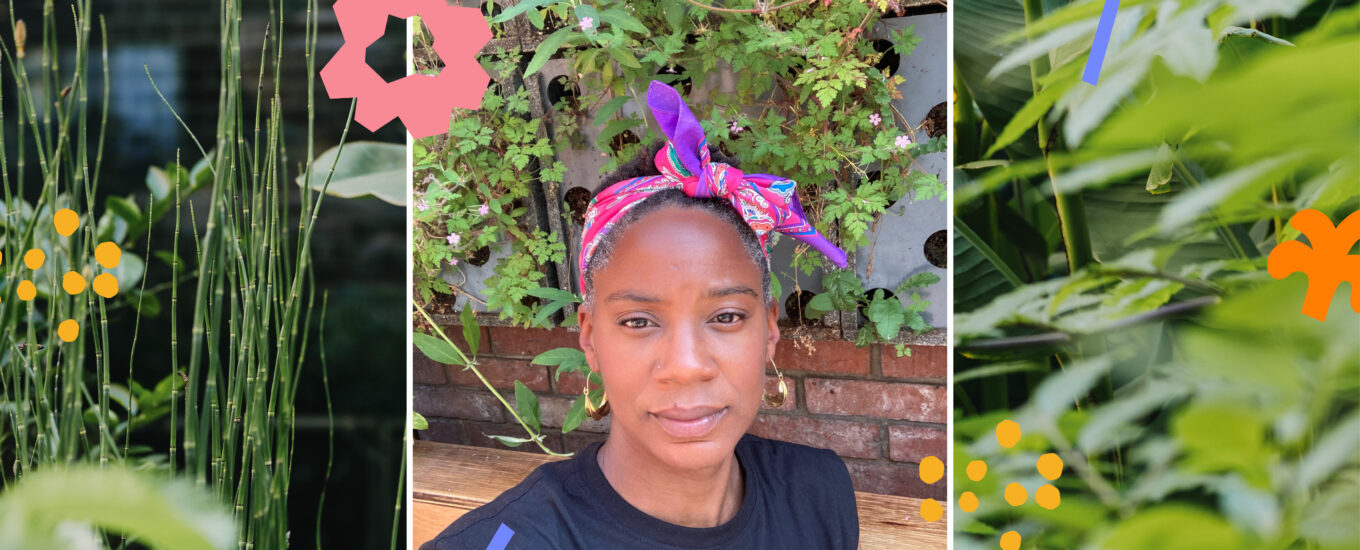Sowing Roots: Meet project curator Dr Ekua McMorris
STORIES

With our new project Sowing Roots, the Garden Museum is embarking on a first of its kind journey into the history of the gardening cultures and traditions that Caribbean people carried with them when they moved to the UK after World War II: from breadfruit, provision grounds, and botanical gardens, to chocho, ackee and the green spaces of South London. How did the horticultural knowledge and traditions of the Windrush generation shape their experiences of migration and community building in the UK? What plants and foods did Caribbean migrants grow – and where? How do their stories enrich our understanding of the power and joy of gardening? Sowing Roots is being led by researchers Dr Ekua McMorris and Dr Elizabeth Cooper, in collaboration with the Garden Museum Head of Learning Janine Nelson and oral historian Jen Kavanagh. To find out more about the project and her work, we asked Ekua a few questions:

Can you let our readers know a bit about yourselves, and what brought you to this project?
Ekua: I am a practicing artist, photographer and researcher. My practice primarily focuses on issues surrounding identity and belonging. I have always used my own experience of being a second generation African Caribbean woman as the basis for my research and creative practice. I have always had an interest in the history of the Caribbean, particularly the history of those who left their home countries to make a better life for themselves here in Britain. I am consciously aware that the stories and experiences of those who are part of the Windrush generation is being lost as people are beginning to pass away. The oral history of the Windrush generation and their experience of gardening in Britain is a truly fascinating one, and one that is not often told. It was only when this project was launched that I began to consider my grandmother’s relationship to her garden and how important it was for her to grow food and plants to sustain her family, which allowed her to still maintain a connection with her home country of Jamaica.
What can people expect from Sowing Roots?
Ekua: Sowing Roots is a really interesting project, it opens up the discussion of gardening and belonging. It focuses on the African Caribbean community that travelled from the Caribbean to the UK during what is now known as the Windrush generation, which is a key part of British history. Yet the stories of those who arrived between 1948 to the early 1970s is one that is multifaceted and often unheard – and includes gardening. People will discover the gardens our participants have made, and learn their individual stories.
Why do you think this is such an important project for the Garden Museum?
Ekua: I think it is important for all museums in Britain to ensure that they represent all communities of people who have made Britain what it is. It is equally important that different types of gardening and gardening experiences are include in the Garden Museum’s collection. A project like Sowing Roots not only diversify the collection and archive that the museum holds, it will also widen the audience who visit the museum.
Part of the project involves inter-generational interviews between young people and Windrush generation gardeners in South London. How did you recruit people to take part?
Ekua: Initially we contacted schools across the borough of Lambeth and Southwark, however, due to the pandemic and the time of year, recruiting young volunteers from schools was not as straight forward as we imagined. However, we were able to broaden participation by also contacting other organisations such as Lambeth Young Careers. It was wonderful to work with a intelligent and engaging group of young people. The dedication and commitment that they brought to the project was more than we could have hoped for, what a privilege to witness and be part of. It was truly great to see the sharing of transgenerational knowledge, experiences and history.
How have the interviews been going, are people happy to share their gardening stories? Any interesting moments to share so far?
Ekua: The interviews have been going really well. Each one is very different, no two experiences are the same and it has been great to hear a variety of stories and experiences of gardening. All of the participants have been very happy to share their stories. It was particularly wonderful to see how many of the gardeners had a creative streak. I really loved hearing on interviewee Morgan Joseph’s, experience of growing up in London and the amazing conservation work that he is doing in St Lucia. We also had the privilege of interviewing Syreeta Levy, the sister of the late Esiah Levy, who had set up the Seed Share project in the belief that everyone should have a right to grow their own food.
What about yourself, do you enjoy gardening at all in your spare time?
Ekua: In my head I am a fantastic gardener, but in reality, I like to look at gardens, be in gardens but not work in them. I cannot get pass the bugs! Sad really! But I do love growing house plants and I have a lot of respect for people who understand the earth and how to work with it.
And what other projects are you working on at the moment besides Sowing Roots?
Ekua: I have just finished working on a book project England Our England which is also about the Windrush generation.
—
The Sowing Roots exhibition will open at the Garden Museum in October 2021.
Find out more about Sowing Roots at our upcoming free community workshops held as part of Lambeth Heritage Festival:
Ruskin Park, 19 September
Loughborough Farm, 26 September
See more of Ekua’s work on her website: www.ekuamcmorris.com